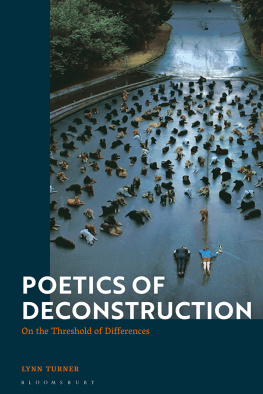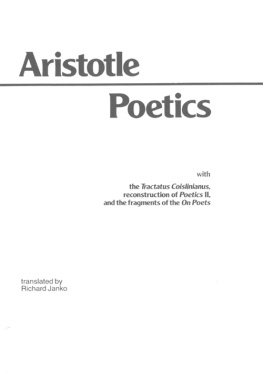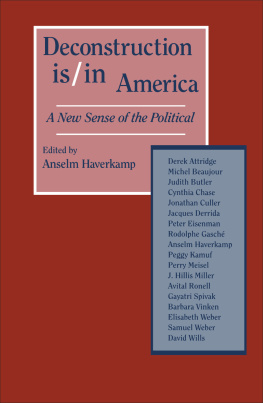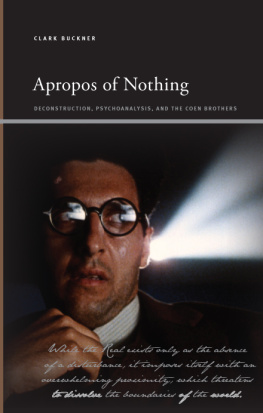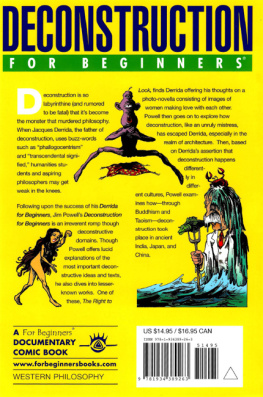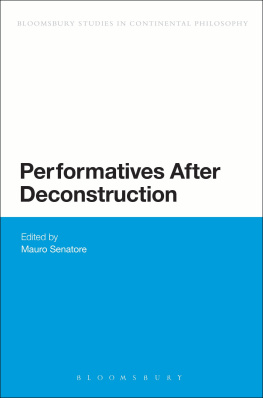Lynn Turner - Poetics of Deconstruction
Here you can read online Lynn Turner - Poetics of Deconstruction full text of the book (entire story) in english for free. Download pdf and epub, get meaning, cover and reviews about this ebook. publisher: Bloomsbury UK, genre: Romance novel. Description of the work, (preface) as well as reviews are available. Best literature library LitArk.com created for fans of good reading and offers a wide selection of genres:
Romance novel
Science fiction
Adventure
Detective
Science
History
Home and family
Prose
Art
Politics
Computer
Non-fiction
Religion
Business
Children
Humor
Choose a favorite category and find really read worthwhile books. Enjoy immersion in the world of imagination, feel the emotions of the characters or learn something new for yourself, make an fascinating discovery.
- Book:Poetics of Deconstruction
- Author:
- Publisher:Bloomsbury UK
- Genre:
- Rating:5 / 5
- Favourites:Add to favourites
- Your mark:
- 100
- 1
- 2
- 3
- 4
- 5
Poetics of Deconstruction: summary, description and annotation
We offer to read an annotation, description, summary or preface (depends on what the author of the book "Poetics of Deconstruction" wrote himself). If you haven't found the necessary information about the book — write in the comments, we will try to find it.
Poetics of Deconstruction — read online for free the complete book (whole text) full work
Below is the text of the book, divided by pages. System saving the place of the last page read, allows you to conveniently read the book "Poetics of Deconstruction" online for free, without having to search again every time where you left off. Put a bookmark, and you can go to the page where you finished reading at any time.
Font size:
Interval:
Bookmark:
Poetics of Deconstruction
Also Available from Bloomsbury
Radical Animism, Jemma Deer
Capitalisms Holocaust of Animals, Katerina Kolozova
The History of Animals, Oxana Timofeeva
Philosophical Posthumanism, Francesca Ferrando
Deleuze and the Schizoanalysis of Feminism,
ed. by Janae Sholtz and Cheri Lynne Carr
Poetics of Deconstruction
On the Threshold of Differences
Lynn Turner

To you
Contents
The origins of these Poetics are, naturally, wildly overdetermined: my parents have taught me more than I realized; sitting in the company of cats has been more conducive to the mood of writing than I would ever have guessed. Barely a trace remains of my doctoral days, many moons ago, living on within this first book, yet I hope that Barbara Engh will enjoy these new constellations (while that fox does not make any appearance, many other animals have now seized the day) and that Adrian Rifkin will still appreciate my illegitimate use of figure.
Huge thanks go to Liza Thompson and Lisa Goodrum at Bloomsbury for their enthusiastic shepherding of this book. Many elements of it were honed through presentations in various contexts (thanks to: Lisa Blackman, Nicholas Chare, Laura Cull, Carolin Eirich, Katve-Kaisa Konturri, Olga Koroleva, Pat Naldi, Tutta Palin, Henry Rogers, Undine Sellbach, Ika Willis, Joanna Zylinska). Eszter Timr deserves special mention since we encountered an array of rollicking hedgehogs on the tour of Budapest with which she welcomed me. Four chapters have been significantly revised and extended from previous incarnations. benefitted from the support of the AHRC (Research Leave Scheme, 20078), responsible for the research surprise that decisively reoriented my work.
Those who have published my work over the last ten years have offered invaluable advice and also been extremely welcome figures of support (Nicole Anderson, Ivan Callus, Istvan Csicsery-Ronay, Stefan Herbrechter, Tora Holmberg, Michael Lawrence, Laura McMahon, Simon Wortham, Manuela Rossini, Julian Wolfreys). To those who listened, heard, read, recognized, remarked, thank you: Ron Broglio, Lindsay Kelley, Vicki Kirby, Ted Geier, Johnny Golding, Helena Hunter, Elissa Marder, Dawne McCance, Jean Paul Martinon, Kelly Oliver, Silke Panse, Wood Roberdeau, Nicholas Royle, Astrid Schrader, Susan Schuppli, Undine Sellbach, Elina Staikou, Kari Weil, Sarah Wood, Cary Wolfe.
Of my former students, I especially thank Ruth Lipschitz, whose now postdoctoral thought continues to be instructive. Lastly, to those taking my Sex Gender Species module at Goldsmiths, holding a space in which to allow theory to air the ludic and ludicrous as we find our way in these appalling times, thank you.
After Jacques Derrida, I would like to choose words that are, to begin with, naked, quite simply, words from the heart. The direct flow of this sentence, metered by four commas, and issued with a cautionary conditional even as it shepherds words from the heart, closes the second paragraph of The Animal That Therefore I Am. It is apparently simple in that no jargon is in immediate evidence. However, invoking the beginning several times in these opening lines, explicitly invoking the testamentary stature of In the beginning, Derrida circles around the desire for origins, the desire not to repeat, the desire for a time before time by which means we should sense the sheer cascading scale of that which he calls the animal question as it jostles with the concept and figure of nudity.
The very idea that words from the heart might convey anything other than unalloyed innocence might steer us at first, crestfallen, towards the deceit, lying in the wings, awaiting the reactive activation of the binary machine (either innocence or deception!). But this work of political philosophy cannot proceed without poetic means (and does not try to do so). Those poetic means might thus recall what appears to be the utter idiosyncrasy of another little text in which a hedgehog curls amongst the invocation that we should learn by heart. There, in response to the demand from the journal Poesia to answer the question What is poetry? (a question posed to the first author published in each issue of that journal), Derrida addresses, you.
Summoning up some of the animals in his previous works including the hedgehog in The Animal That Therefore I Am, Derrida notes that almost all these animals are welcomed, in a more and more deliberate manner, on the threshold of sexual difference. More precisely, of sexual differences. It is true that Derridas now infamous nude scene before his cat generates a strong negative emotion, that of shame. We cannot, however, subtract that shame from the ontotheological conceptual history that would corral this cat to the animal identical to all the others, categorically lesser in kind than the human, while staining mans knowledge with the so-called original sin. What is singular about Derridas work and why I draw so much from it is that he does not defend against his own, top-to-toe or top-to-tail, implication in this history and in ways out of it. The threshold of which he speaks is one of welcome. The silkworms that Derrida observed as a child in Algiers do not issue an anxious lesson in sexual difference but a marvellous secret secretion of sexual and animal differences. Not a word, not a snake. In the beginning, he writes again there was the worm which was and was not a sex, the child could see it clearly, a sex perhaps but then which one?
That something takes perhaps its most unexpected form in Derridas Death Penalty seminars. After his long lament for the lack of a philosophy of abolitionism amid the calculus of pain that is the anaesthesia of the death penalty, the first volume ends with resistance by means of the beating of Derridas heart and the grace of the other heart. In such a gesture he links it with his own writing, and the thought and the risk of writing in deconstruction in its broadest implication.
Resisting the direction in Freud that aligns moral rectitude and the rectitude or erection of the body standing before the law (or indeed a urinal), Derrida resists too the congenital figure of disability lodged in the logic of castration to which the resentful writerly woman is ostensibly destined. There is even a path emerging here that affirms the vulnerability of a resistant feminist emancipation with the nonpower at the heart of power taking shape in The Animal That Therefore I Am. That nonpower is at the beating heart of the transpecific living, and it is sexual without opposition.
*
In the beginnings that follow, you will find an accumulation of scenes given sustained attention. Circling around the desire for origins and for ends without being able to calculate either with the exactitude ordinarily taken for granted, Poetics of Deconstruction inhabits films, art and the psychoanalyses by which they might make sense other than under licence of the subject that calls himself man. That fiction of autonomy, therefore, subsides.
This book draws most substantially from Derrida, making the proximity of deconstruction to bodies of thought such as psychoanalysis more pedagogically available without that proximity being resolved into identity even as the conceptual groundwork that psychoanalysis shares with our inheritance of the dialectical tradition must be set aside. Yet the book brings to light commonality with a number of other writers. On the one hand, shared grounds emerge because Derrida was not in the business of branding concepts to be applied, willy-nilly, regardless of context. Rather he attended to the condition of the living in general even as it aims for singularity: this time, this space, this sex, this animal. On the other, this book engages those who have nourished thought in feminist philosophy, posthumanism and animal studies
Next pageFont size:
Interval:
Bookmark:
Similar books «Poetics of Deconstruction»
Look at similar books to Poetics of Deconstruction. We have selected literature similar in name and meaning in the hope of providing readers with more options to find new, interesting, not yet read works.
Discussion, reviews of the book Poetics of Deconstruction and just readers' own opinions. Leave your comments, write what you think about the work, its meaning or the main characters. Specify what exactly you liked and what you didn't like, and why you think so.

